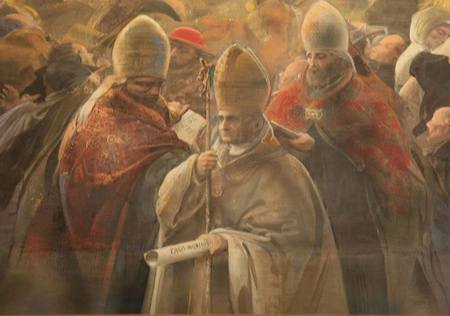Why is Saint Benedict so important for us today? Why spend so much energy trying to promote his cause and to recall his influence upon civilization? One answer is: "The kingdom of heaven is at hand." You may want to read "Translating St Benedict" by Dom Hugh of Douai Abbey (UK) who does a fine job at locating a piece of our interest.
I also think it's a good day to remember that Europe --and the USA-- needs its heavenly patron to get it out of the moral, political and human confusion that is wreaking havoc today. I wonder what life in the USA would be like if we had a "new" Benedict? The Servant of God Pope Paul VI wrote Pacis Nuntius (1964), an Apostolic Letter by which he names Saint Benedict as the principle patron of all of Europe. In this document we read in an abbreviated form why Abbot and Saint Benedict was important not only to the Pope, but to a continent.
In everlasting memory

Messenger of peace, molder of union, magister of civilization, and above all herald of the religion of Christ and founder of monastic life in the West: these are the proper titles of exaltation given to St. Benedict, Abbot. At the fall of the crumbling Roman Empire, while some regions of Europe seemed to have fallen into darkness and others remained as yet devoid of civilization and spiritual values, he it was who, by constant and assiduous effort, brought to birth the dawn of a new era. It was principally he and his sons, who with the cross, the book and the plow, carried Christian progress to scattered peoples from the Mediterranean to Scandinavia, from Ireland to the plains of Poland (Cf. AAS 39 (1947), p. 453). With the cross; that is, with the law of Christ, he lent consistency and growth to the ordering of public and private life. To this end, it should be remembered that he taught humanity the primacy of divine worship through the "opus Dei", i.e. through liturgical and ritual prayer. Thus it was that he cemented that spiritual unity in Europe, whereby peoples divided on the level of language, ethnicity and culture felt they constituted the one people of God; a unity that, thanks to the constant efforts of those monks who followed so illustrious a teacher, became the distinctive hallmark of the Middle Ages.
It is this unity, which St. Augustine calls the "exemplar and type of absolute beauty" (cf. Ep.18: PL 33, 85) but which regrettably has been broken through a maze of historical events, that all men of good will even in our own day seek to rebuild. With the book, then, i.e. with culture, the same St. Benedict, -- from whom so many monasteries derive their name and vigor -- with providential care, saved the classical tradition of the ancients at a time when the humanistic patrimony was being lost, by transmitting it intact to its descendents, and by restoring the cult of knowledge. Lastly, it was with the plow, i.e., with the cultivation of the fields and with other similar initiatives, that he succeeded in transforming wastelands gone wild into fertile fields and gracious gardens; and by uniting prayer with manual labor, according to his famous motto "ora et labora", he ennobled and elevated human work. Rightly, therefore, did Pius XII salute St. Benedict as the "father of Europe" (Cf. AAS loc. Mem.); for he inspired in the peoples of Europe that loving care of order and justice that forms the foundation of true society. Our same Predecessor desired that God, through the merits of this great saint, second the efforts of all those seeking to unite the nations of Europe in fraternal bonds. In his paternal solicitude, John XXIII also greatly desired this to come about.
It is natural, then, that We also give our full assent to this movement that tends toward the attainment of European unity. For this reason, we gladly welcomed the requests of many cardinals, archbishops, bishops, superior generals of religious orders, rectors of universities and other distinguished representatives of the laity from the various European nations to declare St. Benedict the Patron of Europe. And in the light of this solemn proclamation, today's date appears to Us particularly appropriate, for on this day We re-consecrate to God, in honor of the most holy Virgin and St. Benedict, the temple of Montecassino, which having been destroyed in 1944 during the terrible world conflict, was reconstructed through the tenacity of Christian piety. This we do most willingly, repeating the actions of several of Our Predecessors, who personally took steps throughout the centuries towards the dedication of this center of monastic spirituality, which was made famous by the sepulcher of St. Benedict. May so remarkable a saint receive our vow and, as he once dispelled the darkness by the light of Christian civilization and radiated the gift of peace, may he now preside over all of European life and by his intercession develop and increase it all the more.
Therefore, as proposed by the Sacred Congregation of Rites, and after due consideration, in virtue of Our apostolic power, with the present Brief and in perpetuity we constitute and proclaim St. Benedict, Abbot, the Principle heavenly Patron of all Europe, granting every honor and liturgical privilege due by law to primary Protectors. Notwithstanding any provision to the contrary. This we make known and establish, deciding that the present Letter remain valid and effective, that it obtain its full and integral effect and be respected by all those it regards or shall regard in future; so also, may whatever judgment or definition be in accordance with it; and henceforth, may whatever contrary act, by whatever authority it was established, consciously or through ignorance, be deemed invalid.
Given in Rome, at St. Peter's, the 24th of October in the year 1964, the second of Our Pontificate.
Paolo PP. VI


Leave a comment